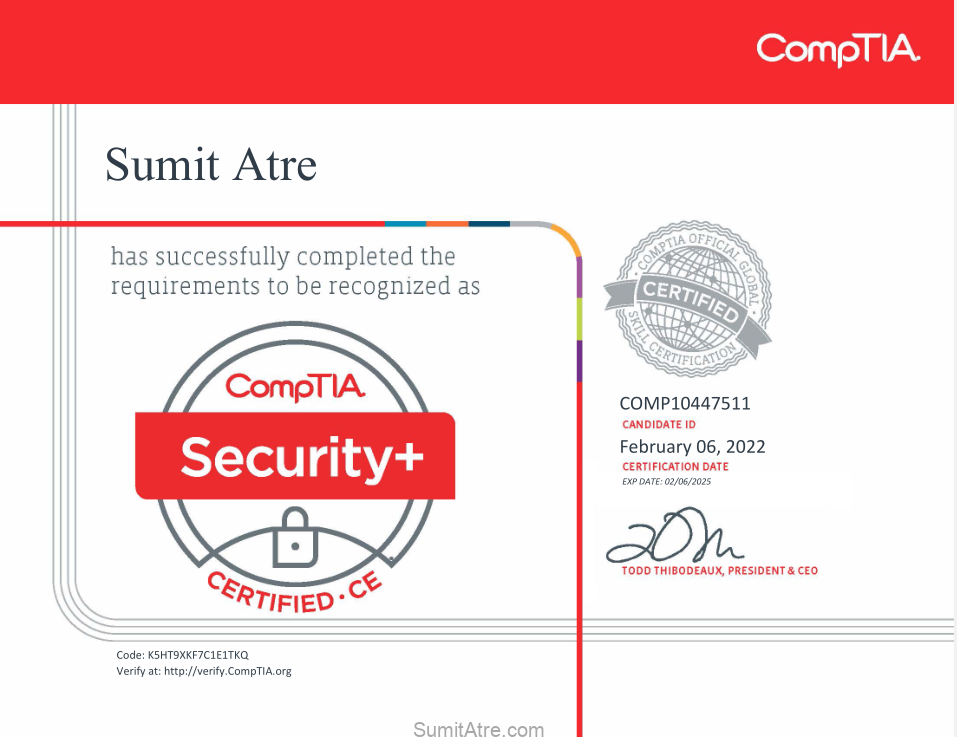This section is about the CySA+. Sumit are you a liar? To answer your rude question, yes I am on occasion when it comes to stuff like writing stuff in sections where it won’t fit elsewhere.
Last year I was knee deep in learning CKA (Certified Kubernetes Administrator). That is just so interesting to me. I remember when VMs became more easier to deploy, it really changed the game having one HV host loads of resources and you can allocate as you wish, restore much easily and have backups onto an external much easier.
Why am I rambling about CKA in a post about Security+ while you’re in the CySA+ section? Because my journey lead me to realizing how little I understand about securing a cluster. How little I truly understand networking and how to prevent attackers.
Which lead me to talking to my co-worker who was well on his way to studying for his CISSP.
Why Security+ is important? Well its two fold. As our landscape changes security in the cyber space has become much more relevant. Since the pandemic the amount of users who left their confines of a secure, locked down office with captive portals, 2FAs, enterprise IDS and Firewalls to a all in one modem with just a VPN and in some cases no Anti Virus applications is staggering. With that change brought out a lot of bad actors from the woodwork trying to get just that one system where they can move onto and hopefully latterly move onto bigger and better things. Crypto skyrocketed and so did ransomware.
https://www.crowdstrike.com/resources/infographics/ransomware-during-covid-19/
What getting the Security+ provided me was a baseline understanding. It lead me into the world of security where I could see the floor but begin to look up and see the vast avenues that are required to keep our cyber lives safe. Ever run Snort on your firewall or any kind of NIDS? Its frightening how often things are constantly checking up on you looking for that one hole to attack you. This applies to your home network as much as your professional.
Even if you don’t plan on having a career in Cyber Security. Its almost required reading at this point. Most of us reading this will know the importance of having separate passwords, enabling 2FA, using a password manager like Bitwarden or LastPass. However, what do you do if you have a botnet infiltration on your network? Do you just pull the plug or isolate the network and study behavior? Do you document everything and have assets for all your devices? How strong is your MDM? What are your weak links in your infrastructure? Do you have one machine that is a Windows XP box but somehow it “needs” to be on the main network? What do you do?
You just gain a certain perspective… something you might have but I didn’t.
The beauty of getting the Security+ is that the principles don’t change, if you chose to pursue the CySA+ or CISSP or pentesting certs. The baseline knowledge is well, baseline.
Resources used
- LinkedIn Learning (formally Lynda) has a few courses, one from the writer of the official study guide Mike Chappel. I find his cadence a bit slow but that works when you can set the playback speed to 2x. If you have a library card check if they let you login and use the premium service for “free”. Its a great resource to have.
- PDF of the official study guide practice questions. I went through each one twice until I was getting 80%. Purchased through Amazon.
- Security+ Prep app for Android (paid 1 month) from Konnect LLC
- DionTraining – I used his site to buy the voucher for the exam 2 weeks before taking it as he provides as “Cheat sheet” notes package. This was great to review real quick
- My car. I work far and in heavy traffic (my poor knees) but since I’m in the car for 3+hrs a day I made good use of that time to listen to the lectures.
The exam is a lot more difficult than I expected but that’s a good thing. Its not a “entry” level exam per-say but anyone can pass it with some determination. How long that takes depends on your experience and skill level. It took me around 2 months.

-Sumit


Be First to Comment